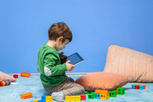Technology has made tablets common. Should kindergartens have these trendy devices? Tablets could revolutionize interactive learning, but their use in preschools is debatable. Here, we’ll discuss kindergarten iPad perks and cons.
Increased Participation and Customized Education
Interaction Playground
Educational apps may make boring ideas fun. Letter tracing applications make learning the alphabet entertaining, while virtual manipulatives make math more engaging. This suits different learning styles and inspires learning.
Customized Learning
Tablets provide personalized learning through differentiated teaching. Kids who learn quickly can go on to harder challenges, while those who need more practice can find tailored activities. This ensures students learn at their own pace.
The Questionable Doubts
Screen Time vs. Play Time
 Play is important for learning, but too much screen time might backfire. Young children learn through exploration, play, and exercise. Some worry that tablets will replace these vital tasks.
Play is important for learning, but too much screen time might backfire. Young children learn through exploration, play, and exercise. Some worry that tablets will replace these vital tasks.
Blue Light Exposure and Attention Spans
Fast-paced apps may make it hard for students to focus on longer class activities. Some worry that tablets’ blue light may disrupt their sleep.
Conclusion: A Reasonable Strategy
Tablets can aid kindergarteners, but they shouldn’t replace traditional instruction. The key is mindful integration. Tablets allow teachers to focus kids while leaving time for free play, group work, and teacher-led instruction. The goal is to create a vibrant classroom that inspires children to learn and grow.
